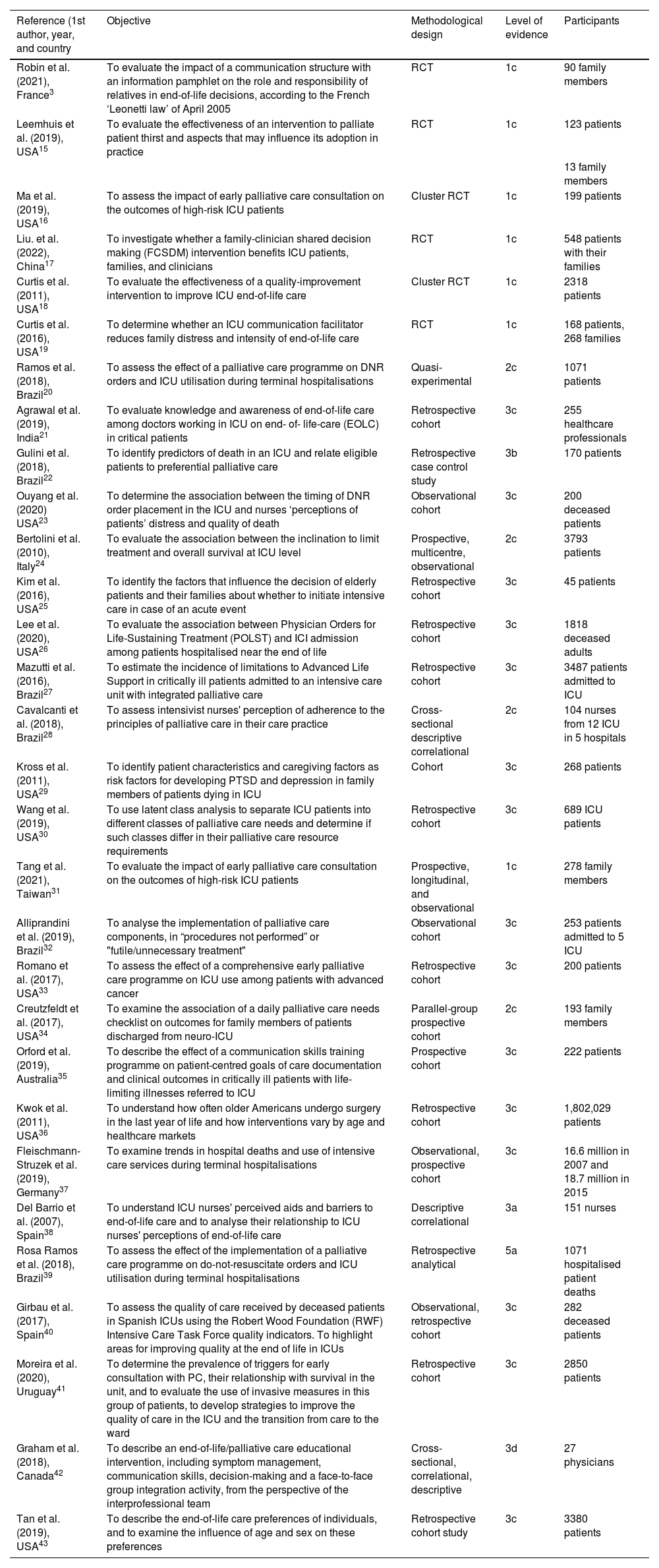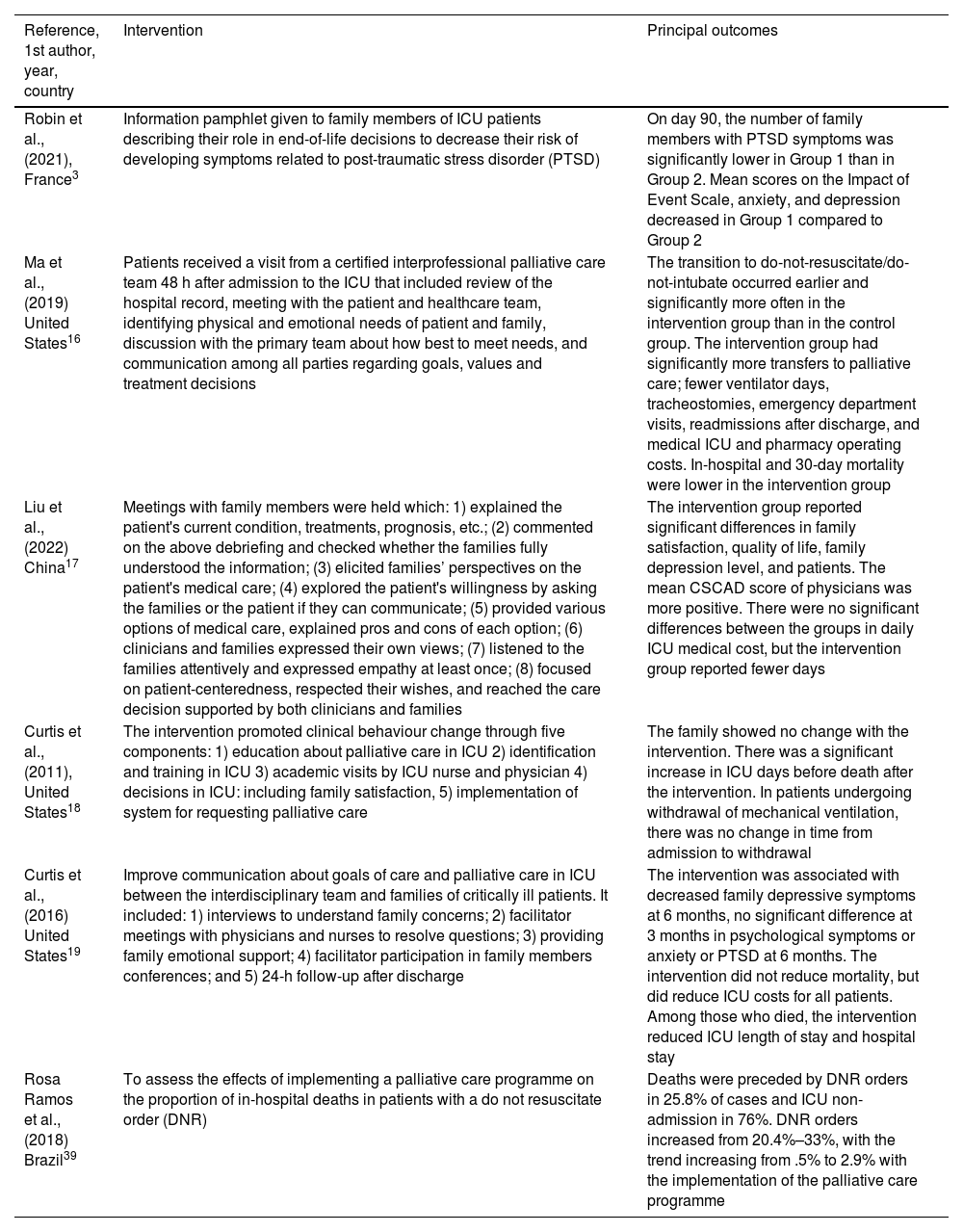The changes in health dynamics, caused by the SARS-COVD-2 pandemic and its consequences, generated a greater need to integrate palliative care in the ICU to promote a dignified death.
ObjectiveIdentify interprofessional interventions and factors that improve the care of patients at the end of life.
MethodologyIntegrative review, including experimental, quasi-experimental, observational, analytical, and descriptive studies with correlation of variables, published from 2010 to 2021, identified in COCHRANE, CINAHL, CUIDEN, LILACS, SCIELO, Dialnet, PsychInfo, PubMed, PROQUES, PSYCHOLOGY, JOURNALS, SCIENCEDIRECT, with MeSH/DECS terms: “Critical Care”, “IntensiveCare” “Life support care”, “Palliative care”, “Life Quality”, “Right to die”. 36,271 were identified, after excluding duplicate title, abstract, year of publication, design, theme, methodological quality, objectives, and content, 31 studies were found.
ResultsIt included 31 articles, 16.7% experimental, 3.3% quasi-experimental, 80% observational, analytical, and descriptive with correlation of variables, 38% published in the United States, 38%, and 19% in Brazil. The pooled sample was 24,779 participants. 32.2% of the studies had level of evidence 1 recommendation (c), and 25.8% level of evidence 2 recommendation (c). This paper synthesises evidence to promote Interprofessional Collaborative Practice in the ICU, improve end-of-life care, and interventions to achieve established therapeutic goals, implement effective care policies, plans, and programmes for critically ill patients and their families; factors that affect palliative care and improve with training and continuing education for health personnel.
ConclusionThere are interventions to manage physical and emotional symptoms, training strategies and emotional support aimed at health personnel and family members to improve the quality of death and reduce stays in the ICU. The interdisciplinary team requires training on palliative and end-of-life care to improve care.
Los cambios de la dinámica en salud, ocasionados por la pandemia por SARS-COVD-2 y sus consecuencias, generaron mayor necesidad de integrar los cuidados paliativos en UCI para favorecer una muerte digna.
ObjetivoIdentificar intervenciones interprofesionales y factores que mejoren el cuidado de pacientes en fin de vida.
MetodologíaRevisión integrativa, incluyó estudios experimentales, cuasi experimentales, observacionales analíticos y descriptivos con correlación de variables, publicados del 2010 al 2021, identificados en COCHRANE, CINAHL, CUIDEN, LILACS, SCIELO, Dialnet, PsychInfo, PubMed, PROQUES, PSYCHOLOGY, JOURNALS, SCIENCEDIRECT, con términos MeSH/DECS «Critical Care»,«Intensive Care», «Life support care», «Palliative care», «Life Quality», «Right to die». Se identificaron 36.271, tras excluir por duplicado, título, resumen, año de publicación, diseño, temática, calidad metodológica, objetivos y contenido resultaron 31 estudios.
ResultadosIncluyó 31 artículos, 16.7% experimentales, 3.3% cuasi-experimentales, 80% observacionales, analíticos y descriptivos con correlación de variables, 38% publicados en Estados Unidos y 19% en Brasil. La muestra agrupada fue de 24.779 participantes. 32.2% de estudios tuvo nivel de evidencia 1 recomendación (c), y 25.8% nivel de evidencia 2 recomendación (c). Este trabajo sintetiza evidencias para favorecer la Práctica Colaborativa Interprofesional en UCI, mejorar la atención en fin de vida, e intervenciones para alcanzar objetivos terapéuticos establecidos, implementar políticas, planes y programas de cuidado efectivos para pacientes crítico y sus familias; factores que inciden en el cuidado paliativo y mejoran con capacitaciones y educación continua al personal de salud.
ConclusiónExisten intervenciones para manejar síntomas físicos y emocionales, estrategias de capacitación y apoyo emocional dirigidas al personal de salud y familiares para mejorar calidad de muerte y disminuir estancias en UCI. El equipo interdisciplinario, requiere formación sobre cuidados paliativos y fin de vida para mejorar el cuidado.
Artículo
Diríjase al área de socios de la web de la SEEIUC, (https://seeiuc.org/mi-cuenta/iniciar-sesion/) y autentifíquese.
Comprando el artículo el PDF del mismo podrá ser descargado
Precio 19,34 €
Comprar ahora











